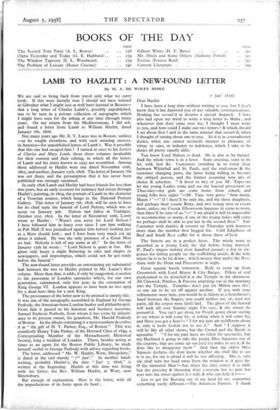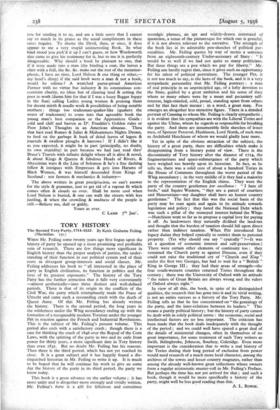LAMB TO HAZLITT : A NEW-FOUND LETTER
BOOKS OF THE DAY
By M. A. DE WOLFE HOWE
WE are said to bring back from travel only what we carry forth. If this were literally true I should not have learned in Gibraltar what I might just as well have learned in Boston— that a long letter of Charles Lamb's, possibly unpublished, was to be seen in a private collection of autographs which I might have seen for the asking at any time through many years. On my return from the Mediterranean, I did ask, and found a letter from Lamb to William Hazlitt, dated January 7th, i8o6.
Not many years ago Mr. E. V. Lucas was in Boston, seeking —as he sought elsewhere, and with such amazing success, 'in America—for unpublished letters of Lamb's. Was it possible that this one had escaped him ? I turned at once to his Letters of Charles and Mary Lamb, those three volumes invaluable for their content and their editing, in which all the letters of Lamb and his sister known in 1935 are assembled. Among those addressed to Hazlitt were one dated November loth, 1805, and another, January ,5th, ,8o6. The letter of January 7th was not there, and the presumption that it has never been published was strongly sustained. • In early 1806 Lamb and Hazlitt had been friends for less than two years, but an early occasion for intimacy had arisen through Hazlitt's painting, in 1804, the portrait of Lamb in the character of a Venetian senator, which hangs in the National Portrait Gallery. This letter of January 7th, 18o6, will be seen to have for its chief topic the funeral of Lord Nelson, which was to occur on January 9th. Nelson had fallen at Trafalgar, October zrst, 1805. In the letter of November loth, Lamb wrote to Hazlitt : " Wasn't you sorry for Lord Nelson ? I have followed him in fancy ever since I saw him walking in Pall Mall (I was prejudiced against him before) looking just as a Hero should look ; and I have been very much cut up about it indeed. He was the only pretence of a Great Man we had. Nobody is left of any name at all." In the letter of January 15th he wrote : " Lord Nelson is quiet at last. His ghost only keeps a slight fluttering in odes and elegies in newspapers, and impromptus, which could not be got ready before the funeral."
The new-found letter provides an entertaining yet substantial link between the two to Hazlitt printed in Mr. Lucas's first volume. More than that, it adds, if only by suggestion, a section to the panorama of London spectacles which, for our own generation, culminated, only last year, in the coronation of King George VI. London appears to have been no less agog for a dead hero than for a new King.
The provenance of the letter now to be printed is simply this : It was one of the autographs assembled in England by George Peabody, the American-born London banker and philanthropist. From him it passed to his kinsman, and business associate, Samuel Endicott Peabody, from whom it has come by inherit- ance to its present owner, his grandson, Mr. Harold Peabody of Boston. In the album containing it a memorandum describes it as " the gift of H. T. Parker, Esq., of Boston." This was manifestly Henry Tuke Parker, of the Harvard Class of 1843, a Corresponding Member of the Massachusetts Historical Society, long a resident of London. There, besides acting at times as an agent for the Boston Public Library, he made himself useful to George Peabody with advice regarding books.
The letter, addressed " Mr. W. Hazlitt, Wem, Shropshire," is dated at the end merely 7th jany.3, In another hand- writing, probably Hazlitt's, the date " JanY 7, 18o6," is written at the beginning. Hazlitt at this time was living with his father, the Rev. William Hazlitt, at Wem, near Shrewsbury.
But enough of explanation. Here is the letter, with all the imperfections of its haste upon its head : (7 JanY i8o6) Dear Hazlitt I have been a long time without writing to you, but I don't know that it has deprived you of any valuable communications. Nothing has occurr'd to deserve a special dispatch. I have also had upon my mind to write a long letter to Malta ; and whenever that duty came over me, I thought I must write to you, and how could I make out two letters ? & which should I set about first ? and in the same manner that occurr'd, when I thought of setting about one to you. So it is in contradictory duties, when one cannot reconcile interest to pleasure, or virtue to ease, or industry to indolence, which I take to be duties all pretty equally alike.
You know Lord Nelson is dead. He is also to be buried. And the whole town is in a fever. Seats erecting, seats to be let, sold, lent &c. Customers crowding in to every shop between Whitehall and St. Pawls, and the tradesman & the customer changing parts, the latter being willing to become the obliged person, and the former assuming new airs of choice & selection. " A favor to beg of you Mr. Tape—to let my young Ladies come and see the funeral procession on Thursday—my girls are come home from school, and young folks love sights "—Mr. Tape very grave " how many, Maam ? "—" 0 ! there'll be only me, and my three daughters, and perhaps their cousin Betty, and two young men to escort them, unless my Cousin Elbowroom happens to come to town, *hen there'll be nine of us."—" I am afraid it will be impossible to accommodate so many, if one of the young ladies will come we perhaps shall be able to put her in the second floor." Exit Customer with thanks, & returns on Thursday with fourteen more than the number first begged for. Cold Edgebone of Beef and Small Ben-- suffer. for it about three °Clock.
The Streets are in a perfect fever. The whole town as unsettled as a young Lady the day before being married. St. Paul's virgers making their hundred pounds a day in six- pences for letting people see the scaffolding inside, & the hole where he is to be let down ; which money they under the Rose share with the Dean and Praecentors at night.
Great aquatic bustle tomorrow. Body to come up from Greenwich with Lord Mayor & City Barges. Fillets of veal predestined to be demolish'd at the Temple in the afternoon. All Chiswick, Pimlico, & Pancras emptying out in the morning into the Temple. Templars don't pay for Militia men tho', so one tax to be set off against another. If you with your refinements were here, you would be as fidjety as a Scotchman's hand between the fingers, you could neither eat, sit, read nor paint, till the corpse were fairly laid. The ghost of the funeral will walk till over Sunday night I'm sure, & the streets be perturb'd. You can't get along for People going about staring to see where it will come by, or asking when it will come by, and Have you got a Seat?—" I for my part am indifferent about it, only it looks foolish not to see it." And " I suppose it will be like all other shows, but the Crowd and the Bustle is agreeable " " I for my part have no relish for spectacles, but my Husband is going to take the young Miss Squeezes out of the country, that are come up out [sic] zoo miles to see it, & he dont like to disappoint them " And then the oldest Miss Squeeze declares she dont know whether she shall like to see it or no, for she is afraid it will be too affecting. She is sure she shall turn her head away from the window as it goes by. 0 the immortal Man !—but when the time comes it is odds but the pressing & thrusting dont constrain her to turn her eyes into the street against h:r will, & who can help it ?—
Just to get the Buzzing out of my head let me remember something vastly different.—The American Farmer. I thank
you for sending it to us, and am a little sorry that I cannot say so much in its praise as the usual compliments in these cases require. To shame the Devil, then, at Once, it does appear to me a very stupid uninteresting Book. In what kind mood you pick'd it up I can't guess, or. how Wordsworth also came to give his testimony for it, but to me it is perfectly disagreeable. Why should a book be pleasant to one, that if it were made into a man (the binding, a coat, the leaves a shirt with a frill, the &c. &c. make out the rest of the metamor7 phosis, I have no time, Lord Nelson & one thing or other,— my head's dizzy) if the said book were a man & not a book, would be odious ? A wretched purse-proud American Farmer with no virtue but industry & its ostentatious con- comitant charity, no ideas but of clearing land & setting the poor to work (damn hint for that if I was a lousy Beggar happy in the Sun) calling Ladies young women & praising them for decent mirth & needle work & possibilities of being notable mothers : things too tradesman-quaker-like (quakers the worst of tradesmen) to come into that agreeable book the young man's best companion or the Apprentices Guide : cold and chill and barren as Dr. Franklin's Golden rules or Poor John's Thoughts in an American almanac. Thou that hast read Romeo & Juliet & Midsummers Nights Dream, to feed on the garbage & husk of dried leaves of legers & journals & swallow ploughs & harrows I If I didn't like it as you expected, it might be in. part (principally, no doubt, its own stupidity) in part because we had just read thro' Bruce's Travels with infinite delight where all is alive & novel, & about Kings & Queens & fabulous Heads of Rivers, & Abyssinian wars & the Line of Solomon & he's a fine dashing fellow & intrigues with Empresses & gets into Harams of Black Women, & was himself descended from Kings of Scotland : not farmers & mechanics & industry—
The above written in great precipitadon, so can't answer for the style & grammar, just to get rid of a vapour fit which comes often & clouds us over. Shall be more cool when Lord Nelson is buried, & one can walk the streets with less justling, & when the crowding & madness of the people is still.—Believe me, dull or giddy, Yours as ever.
C LAMB 7th jany.



































 Previous page
Previous page